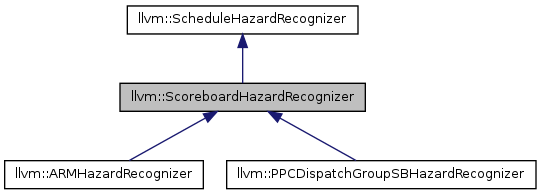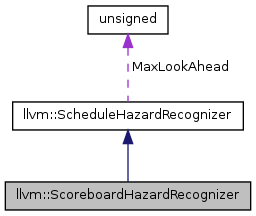#include <ScoreboardHazardRecognizer.h>


Classes | |
| class | Scoreboard |
Public Member Functions | |
| ScoreboardHazardRecognizer (const InstrItineraryData *ItinData, const ScheduleDAG *DAG, const char *ParentDebugType="") | |
| bool | atIssueLimit () const override |
| HazardType | getHazardType (SUnit *SU, int Stalls) override |
| void | Reset () override |
| void | EmitInstruction (SUnit *SU) override |
| void | AdvanceCycle () override |
| void | RecedeCycle () override |
Detailed Description
Definition at line 30 of file ScoreboardHazardRecognizer.h.
Constructor & Destructor Documentation
| ScoreboardHazardRecognizer::ScoreboardHazardRecognizer | ( | const InstrItineraryData * | ItinData, |
| const ScheduleDAG * | DAG, | ||
| const char * | ParentDebugType = "" |
||
| ) |
Definition at line 33 of file ScoreboardHazardRecognizer.cpp.
References llvm::InstrItineraryData::beginStage(), llvm::dbgs(), DEBUG, llvm::InstrItineraryData::endStage(), llvm::InstrStage::getCycles(), llvm::InstrStage::getNextCycles(), llvm::InstrItineraryData::isEmpty(), llvm::ScheduleHazardRecognizer::isEnabled(), llvm::InstrItineraryData::isEndMarker(), llvm::MCSchedModel::IssueWidth, llvm::ScheduleHazardRecognizer::MaxLookAhead, and llvm::InstrItineraryData::SchedModel.
Member Function Documentation
| void ScoreboardHazardRecognizer::AdvanceCycle | ( | ) | [override, virtual] |
AdvanceCycle - This callback is invoked whenever the next top-down instruction to be scheduled cannot issue in the current cycle, either because of latency or resource conflicts. This should increment the internal state of the hazard recognizer so that previously "Hazard" instructions will now not be hazards.
Reimplemented from llvm::ScheduleHazardRecognizer.
Reimplemented in llvm::PPCDispatchGroupSBHazardRecognizer, and llvm::ARMHazardRecognizer.
Definition at line 237 of file ScoreboardHazardRecognizer.cpp.
| bool ScoreboardHazardRecognizer::atIssueLimit | ( | ) | const [override, virtual] |
atIssueLimit - Return true if no more instructions may be issued in this cycle.
Reimplemented from llvm::ScheduleHazardRecognizer.
Definition at line 111 of file ScoreboardHazardRecognizer.cpp.
| void ScoreboardHazardRecognizer::EmitInstruction | ( | SUnit * | ) | [override, virtual] |
EmitInstruction - This callback is invoked when an instruction is emitted, to advance the hazard state.
Reimplemented from llvm::ScheduleHazardRecognizer.
Reimplemented in llvm::PPCDispatchGroupSBHazardRecognizer, and llvm::ARMHazardRecognizer.
Definition at line 179 of file ScoreboardHazardRecognizer.cpp.
References llvm::InstrItineraryData::beginStage(), DEBUG, llvm::InstrItineraryData::endStage(), llvm::ScheduleDAG::getInstrDesc(), llvm::MCInstrDesc::getSchedClass(), llvm::InstrItineraryData::isEmpty(), llvm::TargetInstrInfo::isZeroCost(), llvm::MCInstrDesc::Opcode, llvm::InstrStage::Required, llvm::cl::Required, llvm::InstrStage::Reserved, and llvm::ScheduleDAG::TII.
| ScheduleHazardRecognizer::HazardType ScoreboardHazardRecognizer::getHazardType | ( | SUnit * | m, |
| int | Stalls | ||
| ) | [override, virtual] |
getHazardType - Return the hazard type of emitting this node. There are three possible results. Either: NoHazard: it is legal to issue this instruction on this cycle. Hazard: issuing this instruction would stall the machine. If some other instruction is available, issue it first. NoopHazard: issuing this instruction would break the program. If some other instruction can be issued, do so, otherwise issue a noop.
Reimplemented from llvm::ScheduleHazardRecognizer.
Reimplemented in llvm::ARMHazardRecognizer, and llvm::PPCDispatchGroupSBHazardRecognizer.
Definition at line 119 of file ScoreboardHazardRecognizer.cpp.
References llvm::InstrItineraryData::beginStage(), llvm::dbgs(), DEBUG, llvm::ScheduleDAG::dumpNode(), llvm::InstrItineraryData::endStage(), llvm::ScheduleDAG::getInstrDesc(), llvm::MCInstrDesc::getSchedClass(), llvm::ScheduleHazardRecognizer::Hazard, llvm::InstrItineraryData::isEmpty(), llvm::SUnit::NodeNum, llvm::ScheduleHazardRecognizer::NoHazard, llvm::InstrStage::Required, and llvm::InstrStage::Reserved.
| void ScoreboardHazardRecognizer::RecedeCycle | ( | ) | [override, virtual] |
RecedeCycle - This callback is invoked whenever the next bottom-up instruction to be scheduled cannot issue in the current cycle, either because of latency or resource conflicts.
Reimplemented from llvm::ScheduleHazardRecognizer.
Reimplemented in llvm::PPCDispatchGroupSBHazardRecognizer, and llvm::ARMHazardRecognizer.
Definition at line 243 of file ScoreboardHazardRecognizer.cpp.
| void ScoreboardHazardRecognizer::Reset | ( | ) | [override, virtual] |
Reset - This callback is invoked when a new block of instructions is about to be schedule. The hazard state should be set to an initialized state.
Reimplemented from llvm::ScheduleHazardRecognizer.
Reimplemented in llvm::PPCDispatchGroupSBHazardRecognizer, and llvm::ARMHazardRecognizer.
Definition at line 87 of file ScoreboardHazardRecognizer.cpp.
The documentation for this class was generated from the following files:
 1.7.6.1
1.7.6.1